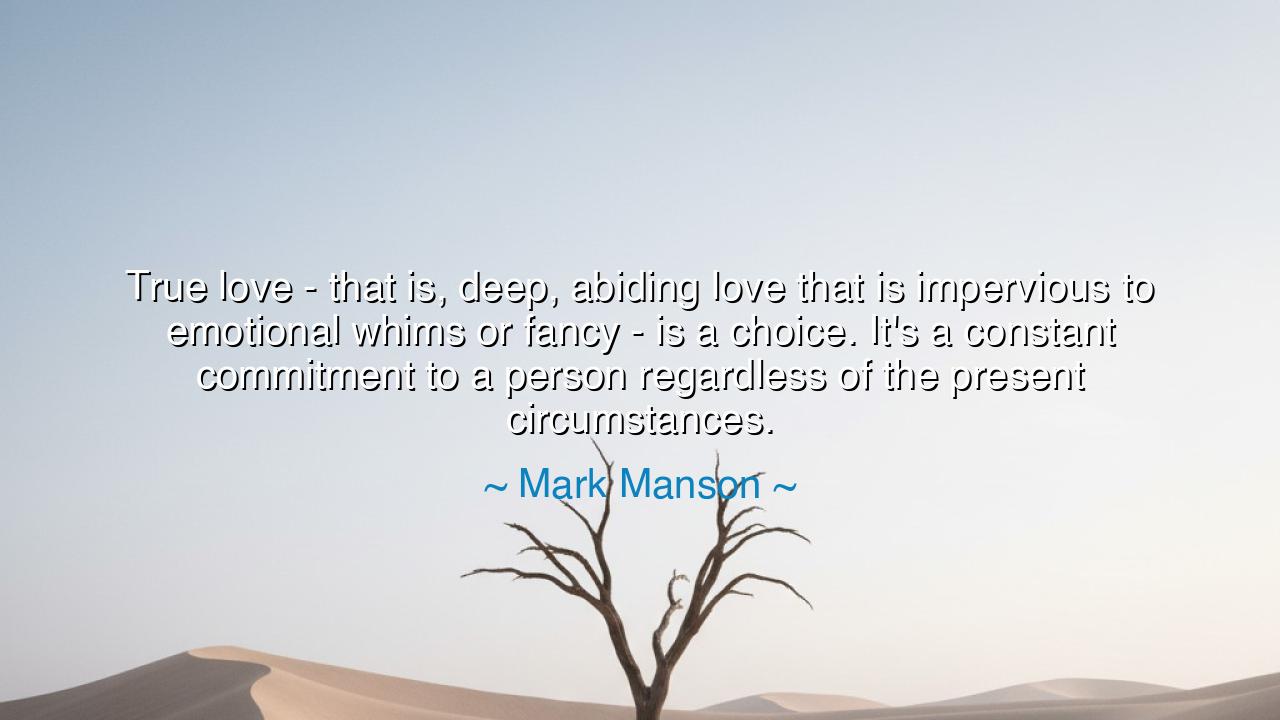
True love - that is, deep, abiding love that is impervious to
True love - that is, deep, abiding love that is impervious to emotional whims or fancy - is a choice. It's a constant commitment to a person regardless of the present circumstances.






“True love — that is, deep, abiding love that is impervious to emotional whims or fancy — is a choice. It’s a constant commitment to a person regardless of the present circumstances.” Thus spoke Mark Manson, a modern sage who strips away illusion and speaks to the soul with the clear voice of truth. In a world that worships passion and novelty, his words remind us of an older, nobler wisdom: that love is not merely a feeling, but an act of will. It is not born in the spark of emotion, but in the steady flame of devotion. Feelings are like the wind — they rise and fall, shift and scatter — but love, when it is true, must stand like a mountain against the changing sky.
To understand his teaching, one must first see the difference between affection and love. Affection is the tender warmth that comes easily — the thrill of beauty, the joy of touch, the charm of companionship. It is the flower that blossoms quickly after the rain. But true love, as Manson describes it, is the root beneath the soil — unseen, yet enduring through storms and droughts alike. It is born not of desire, but of decision. It is not enslaved by circumstance, but transcends it. Such love does not ask, “How do I feel today?” but rather, “What have I vowed? What have I promised?” For the highest love is not found in the fleeting comfort of emotion, but in the sacred commitment of choice.
This truth has echoed through the ages. The ancients understood that love without endurance is like fire without fuel — bright for a moment, then gone. In the story of Odysseus and Penelope, we see love not as passion’s fever, but as steadfast loyalty. For twenty years they were separated by war and fate. Temptation surrounded them both — yet Penelope kept faith, and Odysseus fought through storm and struggle to return. Their love endured not because they always felt it, but because they chose it. This, too, is what Manson speaks of — the love that does not depend on ease or desire, but on the daily decision to remain true.
To say that love is a choice is to honor its sacred labor. It is easy to love when the sun shines, when words are sweet and laughter flows freely. But when the days grow cold — when sickness comes, or hardship, or silence — love must take the form of patience, forgiveness, and endurance. It must dig deep into the soil of the heart and draw strength from duty and compassion. Manson reminds us that love is not the fire that consumes us in youth, but the hearth that warms us in age. It is not a wave to ride, but a covenant to keep.
And yet, this truth is not grim — it is glorious. For when love is a choice, it becomes freedom. The one who loves by will, not whim, is no longer a slave to feeling. They are steady as the oak, while others are tossed like leaves in the wind. This is why ancient marriage vows speak not of pleasure, but of endurance: “for better or for worse, in sickness and in health.” Such promises are not poetic ornaments; they are the pillars that hold the temple of love upright through every storm.
History, too, offers luminous examples of this principle. Think of Mahatma Gandhi and Kasturba, whose love endured imprisonment, exile, and misunderstanding. Their bond was not one of indulgence, but of shared purpose and sacrifice. In loving her husband, Kasturba also loved the cause he served; and in loving her, Gandhi found strength to love humanity. Their union was proof that love grounded in commitment can become a force that changes the world. So too in every home, every friendship, every bond — when love becomes a conscious act of choosing, it rises from personal comfort to spiritual power.
So, my child, take this wisdom to heart: do not mistake the spark for the flame. Passion begins love, but it cannot sustain it. Feelings may fade, but what you nurture through patience, honesty, and choice will endure. Each day, love is renewed not by chance, but by will. When you wake beside the one you’ve chosen — whether friend, partner, or family — choose again. Choose to forgive, to listen, to stay. Choose to love even when it is difficult, for it is in difficulty that love reveals its greatness.
And remember this final truth: true love is not a feeling that finds you — it is the decision to build something eternal from the fragile clay of human hearts. When you love as Manson describes — deeply, abidingly, through joy and sorrow alike — your love will no longer be of this world alone. It will become what the ancients called agape — the divine reflection of the eternal, the living proof that in every heart that chooses rightly, God Himself dwells.






AAdministratorAdministrator
Welcome, honored guests. Please leave a comment, we will respond soon